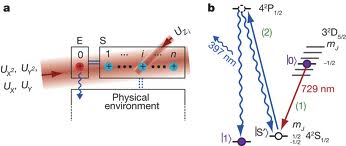Program


We investigate some
contractivity properties for quantum Markov semigroups
defined on a finite dimensional von Neumann algebra.
In particular, we concentrate on a possible generalization to the
non-commutative context of some well-established classical results
about the relations linking spectral gap
and log-Sobolev inequalities with a uniform exponentially fast decay of
a proper entropy.
We consider a quantum stochastic evolution in continuous time defined by the the quantum stochastic differential equation of Hudson and Parthasaraty.
On one side, such an evolution can be defined also by a (very singular and unbounded) Hamiltonian operator K and a standard Schroedinger equation.
On the other side, such an evolution can be obtained also as a limit from Hamiltonian repeated interactions in discrete time.
Our aim is to study how the structure of the Hamiltonian K emerges in the limit from repeated to continuous interactions.
We present preliminary results in the simplest case (trivial multiplicity and system spaces), where the calculations can be explicitly performed, and the proper formulation of the problem can be discussed.